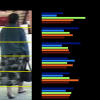Free Online Productivity Tools
i2Speak
i2Symbol
i2OCR
iTex2Img
iWeb2Print
iWeb2Shot
i2Type
iPdf2Split
iPdf2Merge
i2Bopomofo
i2Arabic
i2Style
i2Image
i2PDF
iLatex2Rtf
Sci2ools
274
click to vote
Publication
Person Re-Identification: What Features are Important?
State-of-the-art person re-identi
cation methods seek robust person matching through combining various feature types. Often, these features are implicitly assigned with a single vector of global weights, which are assumed to be universally good for all individuals, independent to their di
erent appearances. In this study, we show that certain features play more important role than others under di
erent circumstances. Consequently, we propose a novel unsupervised approach for learning a bottom-up feature importance, so features extracted from different individuals are weighted adaptively driven by their unique and inherent appearance attributes. Extensive experiments on two public datasets demonstrate that attribute-sensitive feature importance facilitates more accurate person matching when it is fused together with global weights obtained using existing methods.
| Added | 02 Oct 2012 |
| Updated | 02 Oct 2012 |
| Type | Conference |
| Year | 2012 |
| Where | ECCV, International Workshop on Re-Identification |
| Authors | Chunxiao Liu, Shaogang Gong, Chen Change Loy, Xinggang Lin |
Comments (0)






